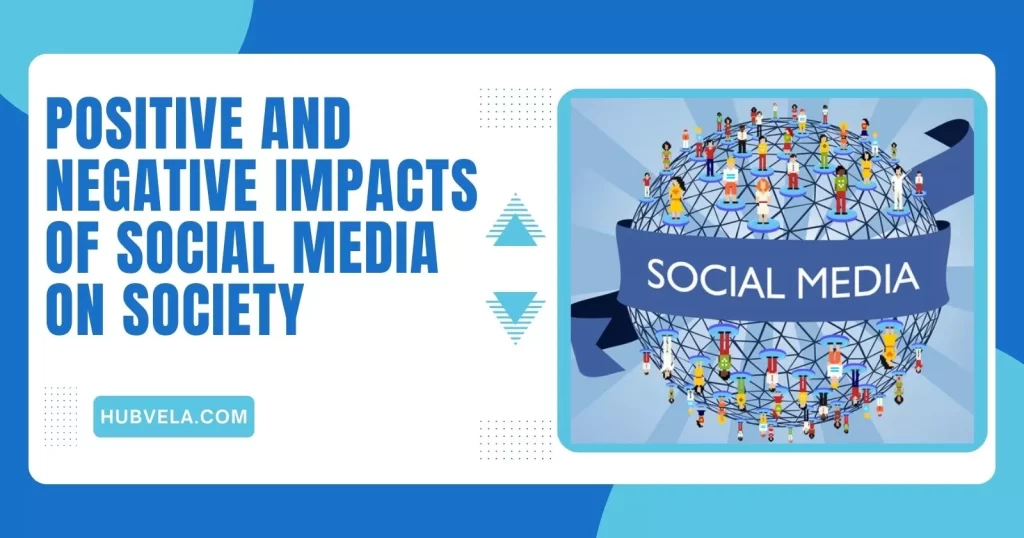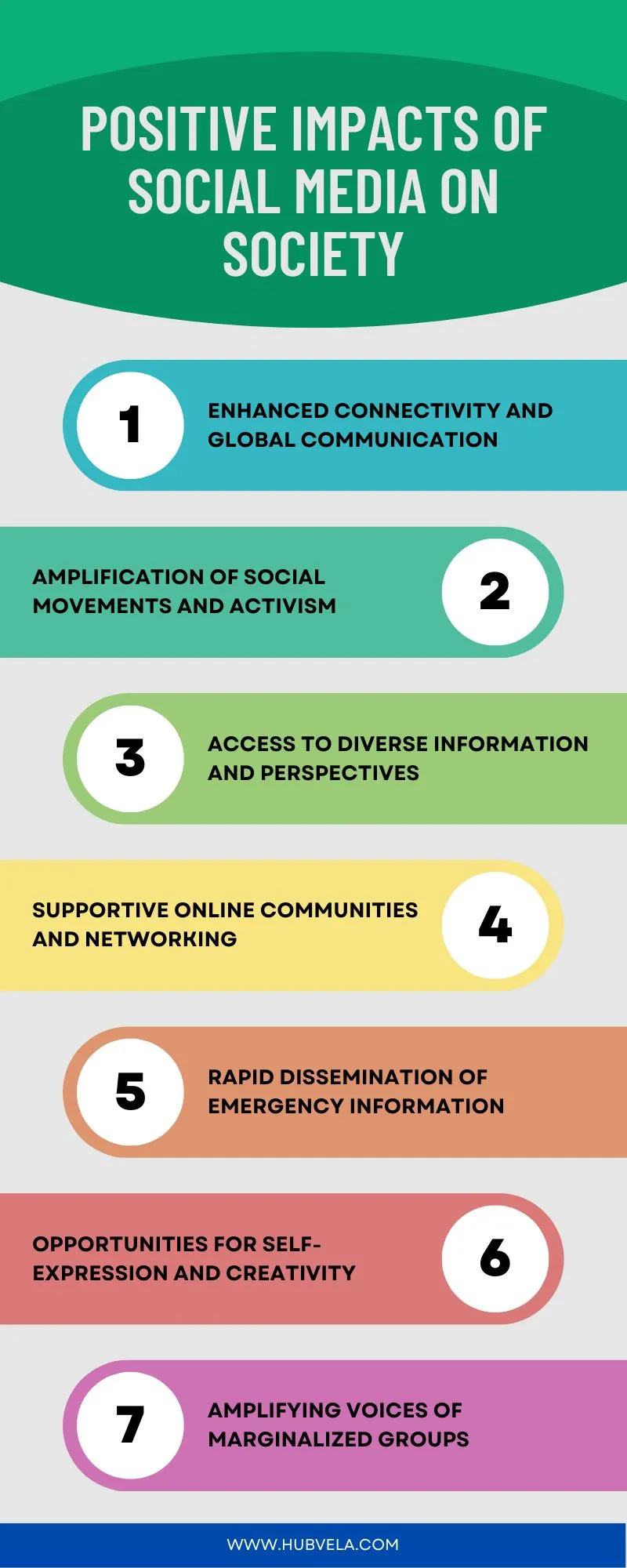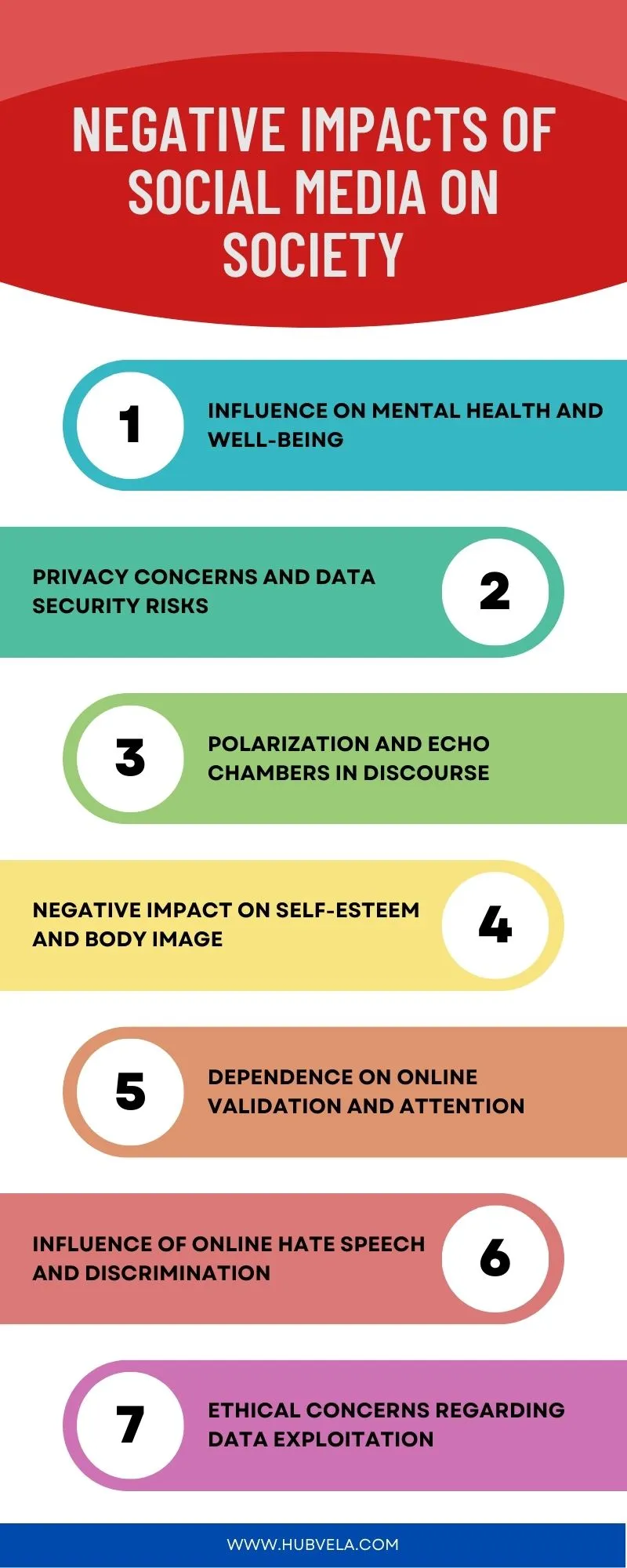Social media has become an integral part of our lives, and its impact on society is undeniable.
While it has brought people closer together and made communication more accessible, it has also been associated with negative effects on mental health and social interaction.
In this article, we will explore the positive and negative impacts of social media on society. We will discuss the pros and cons of social media use and how it affects our mental health, socialization, and relationships.
By understanding these effects, we can learn to use social media for the right reasons and avoid problems with social media and mental health.

--Advertisement--
Positive Effects of Social Media on Society
Social media has become an integral part of our lives, and it has both positive and negative effects on society. While the negative effects of social media are often highlighted, it is important to recognize the positive impact it can have on our lives.
According to a Harvard study, routine social media use is positively associated with social well-being, self-rated health, and mental health. We will focus on the positive effects of social media on society.

1. Enhanced Connectivity and Global Communication
Social media has greatly enhanced connectivity and global communication. Platforms like Facebook, Twitter, and Instagram have made it easier for people to connect with each other regardless of their location.
Social media has also made it easier for people to share information and ideas, which has led to the spread of knowledge and awareness about important issues.
For example, social media played a crucial role in the Arab Spring uprisings, where people used platforms like Twitter and Facebook to organize protests and share information with the world.
Additionally, social media has made it easier for businesses to reach a global audience and connect with customers in real-time. The enhanced connectivity and global communication brought about by social media have had a positive impact on society.
2. Amplification of Social Movements and Activism
Social media has had a significant impact on social movements and activism, as it has the power to amplify voices, instantaneously spread information, and increase collaboration across diverse groups of people.
Social media has revolutionized communication and access to information on both a national and global scale, changing the way we think about, connect to, and engage with social justice and activism.
Social media has accelerated the recruitment and mobilization of social movements, and has given an active role to activists and intermediate leaders as competitors to central leaders in social movements.
Social media has also created opportunities for amplifying the causes of like-minded activists, and has been used to attract global support for fights against a range of injustices.
While most Americans believe social media platforms are an effective tool for raising awareness and creating sustained movements, majorities also believe they are a distraction and lull people into believing they are making a difference when they’re not.
Social media has both positive and negative effects on social movements and activism, and it is important to understand how to use it effectively to drive real-world change.
3. Access to Diverse Information and Perspectives
Access to diverse information and perspectives is one of the positive effects of social media on society.
Social media platforms allow users to connect with people from different backgrounds and cultures, providing an opportunity to learn about diverse perspectives and experiences.
According to a survey by the Pew Research Center, teenagers use social media to meet people from different backgrounds, get diverse views, and demonstrate their support for causes.
Social media groups can provide a sense of belonging and community, access to support from like-minded individuals, an appreciation of different perspectives, and reduced isolation.
Additionally, social media can help to develop critical thinking skills by exposing users to a variety of viewpoints and opinions.
However, it is important to note that social media can also contribute to polarization and the spread of misinformation, which can limit access to diverse information and perspectives.
4. Supportive Online Communities and Networking
Supportive online communities and networking are one of the positive effects of social media on society. Social media platforms provide a space for people to connect with others who share similar interests, experiences, and goals.
These online communities can provide emotional support, advice, and encouragement to individuals who may not have access to such resources in their offline lives.
For example, people with chronic illnesses can connect with others who have similar conditions and share information about treatments, coping strategies, and emotional support.
Social media can also provide networking opportunities for individuals seeking employment or career advancement.
Professional networking sites like LinkedIn allow users to connect with others in their industry, share job postings, and showcase their skills and experience.
Supportive online communities and networking can have a positive impact on individuals’ mental health, social connections, and career prospects.
5. Rapid Dissemination of Emergency Information
Social media has had a positive impact on society by enabling the rapid dissemination of emergency information. During emergencies and crises, such as the COVID-19 pandemic, social media has been used to disseminate key information quickly and effectively.
Social media platforms like Twitter and Facebook have been used to share information about the pandemic, including updates on the number of cases, the availability of vaccines, and guidelines for staying safe.
Social media has also been used to access information from the public, allowing emergency responders to tailor their response to the needs of the affected population.
In addition, social media has been used to engage citizens in emergency management by disseminating information to the public and accessing information from them.
Social media has proven to be a valuable tool for disseminating emergency information and improving emergency response efforts.
6. Opportunities for Self-Expression and Creativity
Creative self-expression is an important aspect of human life that can have positive effects on our well-being.
Self-expression involves any activity where we can transfer the energy from our thoughts and feelings into another form, such as writing, painting, dancing, or singing.
The creative arts allow us to check in with our mental well-being and emotional state, much like paying attention to how we feel physically.
By expressing ourselves creatively, we can channel our thoughts and feelings to make our hearts feel lighter and our minds at rest. Creative self-expression can help us manage our emotions, reduce stress levels, boost self-esteem, and improve cognitive functioning.
It can also be a powerful tool for healing emotional pain and patterns. By cultivating an appreciation for beauty through creative expression, we can open ourselves up to a world of possibilities and inspiration.
7. Amplifying Voices of Marginalized Groups
Social media has been a powerful tool for amplifying the voices of marginalized groups. Digital technologies have allowed individuals and groups to connect and organize in ways that were not possible before, providing an alternative way of organizing society and pushing back against hostile societal narratives.
By using social media platforms, marginalized communities can share their stories, advocate for their rights, and bring attention to issues that affect them.
Listening to marginalized voices allows for constructive ideas for improving organizational processes and functions to reach decision-makers, which is critical to achieving better decision-making practices, increased creativity, and improved inclusion.
The use of social media to uplift voices and stories, create awareness, and build and strengthen relationships creates a space for organizations, activists, and citizens to demand justice.
Social media has provided a platform for marginalized groups to have their voices heard and to enact social change.
Negative Effects of Social Media on Society
Social media has become an integral part of modern society, with billions of people using various platforms to connect with others, share information, and stay informed about current events.
While social media has many benefits, such as facilitating communication and providing access to information, it also has negative effects on society. We will explore the negative effects of social media on society in more detail.

1. Influence on Mental Health and Well-Being
Social media has been linked to negative effects on mental health and well-being. Studies have found that heavy social media use is associated with an increased risk for depression, anxiety, loneliness, self-harm, and even suicidal thoughts.
Social media may promote negative experiences such as neglecting face-to-face relationships, distracting from work or school, and leaving users feeling envious, angry, or depressed.
Furthermore, social media use has been tied to decreased, disrupted, and delayed sleep, which is associated with depression, memory loss, and poor academic performance.
Social media use can also affect users’ physical health more directly, as the connection between the mind and the gut can turn anxiety and depression into nausea, headaches, muscle tension, and tremors.
Therefore, it is important to reassess social media habits if they are causing negative effects on mental health and well-being.
2. Privacy Concerns and Data Security Risks
Social media has become an integral part of everyday life for many people, but it also raises concerns about privacy and data security risks.
With the large amount of data on users’ social media accounts, scammers can find enough information to spy on users, steal identities, and attempt scams. Data protection issues and loopholes in privacy controls can put user information at risk when using social media.
The massive stores of personal data that social media platforms collect and retain are vulnerable to hacking, scraping, and data breaches, particularly if platforms fail to institute critical security measures and access restrictions.
Personal data held by social media platforms is also vulnerable to being accessed and misused by third parties, including law enforcement agencies.
These growing privacy concerns have prompted advocacy for tighter regulations. It is important for social media users to be aware of the risks and take steps to protect their personal information.
3. Polarization and Echo Chambers in Discourse
Social media have been criticized for contributing to polarization and echo chambers in discourse, where individuals are exposed only to information that confirms their existing beliefs and opinions.
Social media algorithms often prioritize content that is more likely to engage users, which can lead to the spread of sensationalized or biased information.
This can create an environment where individuals are less likely to engage with opposing viewpoints or engage in civil discourse, leading to a breakdown in communication and understanding.
The echo chamber effect can also contribute to the spread of misinformation and conspiracy theories, which can have serious consequences for public health and safety.
While social media can be a valuable tool for connecting individuals and sharing information, it is important to be aware of the potential negative effects and take steps to mitigate them.
4. Negative Impact on Self-Esteem and Body Image
Social media can have a negative impact on self-esteem and body image. Exposure to images of idealized body types can create unrealistic beauty standards, leading to body dissatisfaction and low self-esteem in both women and men.
Social media can expose users to hundreds or even thousands of images and photos every day, including those of celebrities and fashion or fitness models, which can lead to greater dissatisfaction with body weight and shape.
Users may feel pressure to edit out perceived flaws in their own images, which can be harmful. However, there is also encouraging content that aims to promote healthy lifestyles and body positivity.
It is important to be aware of the complex and multifaceted ways in which social media can affect body image and to curate one’s feed to make it a healthier space.
Studies have shown that reducing social media use can significantly improve body image and appearance satisfaction.
5. Dependence on Online Validation and Attention
Social media platforms have created a culture of seeking validation and attention through likes, comments, and shares.
People often rely on the number of likes or followers they have as a measure of their self-worth or popularity, which can lead to a dependence on online validation.
This dependence can have negative effects on individuals’ mental health and self-esteem, as they may constantly seek external validation and compare themselves to others.
Additionally, the pressure to present a perfect image on social media can lead to feelings of inadequacy and contribute to the development of anxiety and depression.
It is important for individuals to recognize the potential negative impact of seeking validation solely through social media and to prioritize their mental well-being by seeking validation from within and cultivating healthy offline relationships.
6. Influence of Online Hate Speech and Discrimination
Social media has been criticized for facilitating the spread of hate speech and discriminatory content, which can have serious negative effects on individuals and society as a whole.
Online hate speech can contribute to the normalization of discriminatory attitudes and behaviors, leading to increased prejudice and discrimination in offline settings.
It can also contribute to the development of mental health issues, such as anxiety and depression, particularly among individuals who are targeted by hate speech.
Social media platforms have a responsibility to monitor and remove hate speech and discriminatory content, but individuals can also take steps to combat online hate speech by reporting it and engaging in civil discourse.
It is important to recognize the potential negative impact of online hate speech and discrimination and to work towards creating a more inclusive and respectful online environment.
7. Ethical Concerns Regarding Data Exploitation
One of the major concerns with social media is the ethical implications surrounding data exploitation.
Social media platforms collect vast amounts of user data, including personal information, browsing habits, and preferences, which can be used for targeted advertising and other purposes.
This raises concerns about privacy, consent, and the potential misuse of personal information.
Additionally, the algorithms used by social media platforms to curate content and personalize user experiences can create filter bubbles and echo chambers, limiting users’ exposure to diverse perspectives and information.
This can have negative effects on society by reinforcing biases, perpetuating misinformation, and hindering critical thinking.
It is important for individuals and policymakers to address these ethical concerns and ensure that data exploitation is regulated and transparent to protect user privacy and promote a more informed and inclusive online environment.
Conclusion on Positive and Negative Impacts of Social Media on Society
In conclusion, social media has both positive and negative effects on society. While it has transformed people’s lifestyles and enabled them to connect with others from all over the world, it has also caused problems such as mental health issues, cyberbullying, and the spread of misinformation.
The effects of social media are complex and vary from person to person, and while some argue that it is having a negative impact on youth by decreasing social interaction, others are in disbelief of this claim.
It is important to use social media responsibly and be mindful of its effects on our lives and society as a whole. With more time and further research, clearer conclusions can be drawn about the effects of social media.


